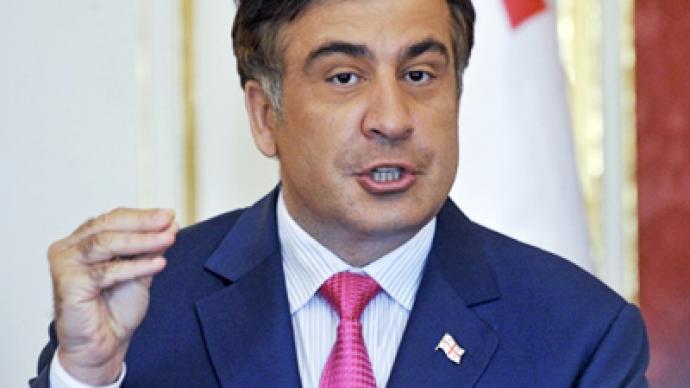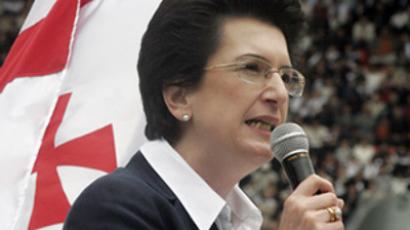Sacking Saakashvili

Following large protests in Tbilisi at the weekend and with more anticipated for a “Day of Wrath” on Wednesday, Georgian President Mikhail Saakashvili may be facing his gravest political threat to date.
Once upon a regime, Mikhail Saakashvili could point north to “imperialistic Russia” as the mother of all Georgia’s problems. Nationalistic sword-rattling and chest-beating, however, which ultimately pushed Tbilisi into a deadly five-day conflict with its preponderant neighbor to the north, can never cure a nation of its domestic ills. Indeed, it can only serve to exasperate them. Judging by the present mood of this spirited Caucasian nation (whose economy experienced a major setback since its local producers – namely, the Georgian winegrowers – lost access to valuable Russian markets after the events of August 2008) the days of blaming Russia for its internal problems are beginning to wane. Indeed, an increasing number of Georgians understand that a foreign policy program that places Russia in the crosshairs will only backfire in the long run.These sentiments exploded to the surface on the very threshold of the regime on Sunday as an estimated 6,000 to 10,000 protesters gathered in Tbilisi and Batumi to demand the resignation of President Saakashvili. Oppositional politicians say it is just the beginning of yet another revolution to rock the nation. If Sunday’s rallies were any indication of things to come, the Georgian leader will not relinquish his grip on power without a fight, and probably a bloody one.The police broke up the rallies with tear gas, batons and rubber bullets, while at least 10 people were arrested. Injuries were reported on both sides.Moscow has warned that the violentdispersal of demonstrations in Tbilisi and Batumi are a violation of fundamental human rights and liberties, Konstantin Dolgov, the Russian Foreign Ministry's envoy for human rights, democracy and rule of law, said."Such actions by the Mikhail Saakashvili regime cannot be seen other than as hampering the exercise by the public and the country's political forces of their statutory rights to the freedom of assembly and expression of opinions, enshrined in the European Convention for Human Rights and Fundamental Freedoms," the ministry said in a statement on Monday.Such actions will only provoke an even greater destabilization of the general situation in the country, Dolgov added.The protesters are being rallied to the streets by the Georgia Party, as well as former parliament speaker Nino Burdzhanadze, who chairs the Democratic Movement – United Georgia partyBurdzhanadze, who favors mending relations with Russia, was the first opposition leader to cross the political Rubicon, so to speak, when she declared that "a revolution has already actually started in Georgia." She went on to warn that on Wednesday, May 25, the protesters would overthrow Mikhail Saakashvili, who once agitated for power as well in the so-called "Rose Revolution" of 2003.Burdzhanadze has compared the Saakashvili administration with a new form of Bolshevism, which cannot tolerate any sort of alternative opinion. Tbilisi’s relations with Russia were singled out as an example."Neo-Bolshevism currently reigns in Georgia,” she said. “Anyone with an opinion different from the position of the authorities, is regarded as "the people's enemy or an agent of the Kremlin."Another oppositional politician with harsh words for “the current regime” is Sozar Subari, the leader of the Georgian Party current regime is maintained only by terror."They do not care about the people, so on May 25, we will completely do away with the Saakashvili regime," he said.Georgian opposition: smoke without fire?Some political experts, however, say the Georgian opposition is all smoke and no fire. According to one recent poll, Burdzhanadze is supported by no more than 1.5 percent of the country's citizens.Political analyst Giya Khukhashvili, quoted by Nezavisimaya Gazeta, a Russian daily, expressed skepticism about the possibilities of the protesters overthrowing Saakashvili in the near future, but hinted cautiously: "maybe they really have an ace up their sleeve."Meanwhile, the “Day of Wrath” scheduled for Wednesday is beginning to break up before it even gets off the ground.The Georgian Party, for example, has cancelled its participation in the protest against the Saakashvili regime, Georgian media outlets reported on Tuesday, citing the party's statement. According to media inside Tbilisi, the reason for this decision is the refusal by the Popular Assembly, a public organization currently staging a protest in Tbilisi, to cooperate coordinate activities with the Georgian Party."We are renouncing the May 25th protest we have announced earlier and giving full freedom of action to the Popular Assembly," the Georgian Party said. Also, former Georgian defense minister and one of the Georgian Party leaders, Irakly Okruashvili, who has been living in exile in France, has cancelled his plans to return to his native country on May 25, the party statement said.Clearly, although there is some rumbling happening in Georgia’s grassroots movements, the time is not yet ripe for another upheaval on par with the “Rose Revolution.” "The 2003 scenario when Saakashvili came to power as a result of the revolution is currently impossible in Georgia," Georgian political analyst Igor Gvritishvili told the Russian News Service in a recent interview. "Then Saakashvili enjoyed massive support against the backdrop of a very difficult economic situation. However, at present the abscess has not burst, but the opposition has ventured upon dynamic actions."Tapping widespread dissatisfactionHowever, many analysts assess the chances of the opposition from a different perspective. "If the action declared for May 25 actually takes place, the largest ever opposition rallies, comparable to the events of November 2007…may take place in Georgia," Kommersant, the Russian business daily reported.The opposition reflects a very wide spectrum of dissatisfied people, the paper stressed. Political observers predict that if the various parties and organizations can patch up their differences and show up for the Day of Wrath on Wednesday, the opposition will gather an unusually strong force. Director of the Institute of Political Studies Sergei Markov said it is currently difficult to predict any clear outcome in the confrontation. "It's hard to predict the outcome of the current confrontation between Saakashvili and the opposition. They enjoy approximately equal support, and Saakashvili's support is more concentrated in rural areas and in the state apparatus, in law enforcement agencies,” Markov told Komsomolskaya Pradva. “And the opposition support is concentrated more in large cities. Maybe everything will end like the previous time: Saakashvili withstood, and the opposition in several months lost its power, enthusiasm and became exhausted.”Markov, however, left open the possibility that the “collapse” of the Saakashvili regime could come at any moment. “An event…as a result of which the Saakashvili regime will collapse can also happen any time," he warned.Robert Bridge, RT













